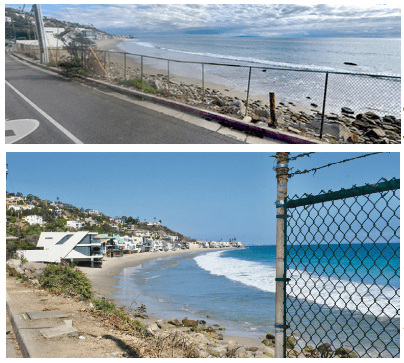Last Thursday, the Mountains Recreation and Conservation Authority (MRCA) announced on its website its newest coastal access point in Malibu: Carbon-La Costa Beach, located at 21704 and 21714 Pacific Coast Highway (PCH).
The two adjacent vacant lots where Carbon and La Costa beaches come together have been intended for public access for nearly 20 years, but that had not officially happened when access was suddenly made available earlier this spring. Plans were still in the works between the MRCA and the California State Coastal Conservancy for making certain improvement to the area before it was opened up. Due to an unexpected and unique set of circumstances, though, the fence was ripped down and the public got access early on May 3.
The residents of that area were livid that the public started parking—dangerously, according to many—on PCH to reach the beach, and the public also began causing a nuisance on the beach because of the lack of bathrooms, trashcans or any other public amenities.
A fence had existed between the beach and PCH for decades at that location, which prevented the general public from entering. Photos show two different kinds of fence, and both old and dilapidated.
According to a presentation given to the California Coastal Commission from the MRCA during its May 12 meeting, the two parcels were long designated for coastal access. MRCA Project Manager Mario Sandoval told the commission that one vacant parcel had been dedicated to public access in 1999 to mitigate the impacts of three new developments on Carbon Beach and the second had been purchased by the coastal conservancy in 2003. Both parcels were already fenced at that time and remained fenced.
In his talk, Sandoval explained that Malibu resident Doug Rogers had complained to MRCA about the condition of the fence three different times last summer. And, despite the MRCA’s almost same-day efforts to respond, according to Sandoval, the neighbors kept doing “self-help” repairs and Rogers wanted the fence replaced. The neighbors there finally removed the old fence and “built a new, unpermitted fence without waiting for the proposed public access improvements to be approved.”
Once MRCA ascertained from the city that the new fence was unpermitted, the agency removed it.
But many questions remained unanswered: Why didn’t the MRCA leave it up until the public access improvements and/or safety studies were made? Was the fence actually on MRCA property or Caltrans property (as some in the community have suggested)? Why did the state leave the fences up for 20 years after acquiring the land and then suddenly approve their removal?
Sandoval also took the opportunity to throw in the usual jabs against Malibu—a longtime foe—painting a picture of uncaring elites trying to keep out the disenfranchised and the handicapped. He claimed there had been “exceptional public pressure to get to the beach, like at La Costa,” but offered no specifics. In addition, MRCA claimed that the fenced area “is especially used by people with disabled parking placards,” but again offered no proof. Sandoval played a video of an MRCA employee proclaiming—in Spanish—about how the beach belongs to everyone.
Sandoval claimed the City of Malibu had illegally posted “No Parking” signs along that fence until they were finally removed in February. Later, he said the neighbors illegally posted “No trespassing private property” signs when they put up their new fence, which were also removed.
On May 27, the coastal conservancy took public comments on the Malibu Coastal Access Public Works Plan Initial Study. Resident Larry Rosenthal wrote, “A fence that was removed by SMMC/MRCA has caused an immediate danger to the public. The fence … should not have been removed without a full Caltrans study. I took a video last week showing people almost killed running across PCH on the blind curve where the fence was removed, which now allows coastal access. The CCC’s own December 2019 report specifically says it’s a danger and requests a feasibility study prior to the removal of the fence. I can add there’s no crosswalk … The fence should be returned … until the studies have been completed.”
MRCA’s monthly report to the California Coastal Commission on June 9, titled “Harassment of public employees at Carbon-LaCosta Beach,” stated that two residents had called the sheriff’s department to complain that MRCA was doing construction without permits. MRCA responded that on June 3 they were just finishing the job of removing the fence. The sheriff’s report confirmed there was no wrongdoing because MRCA owns the property.
In the June 9 coastal commission report, MRCA also included traffic accident data for that area in an attempt to prove that fence removal had not been dangerous for parking and pedestrians.
“The city can’t do anything, but it’s a true safety hazard,” said Chris Frost, the chair of the Malibu Public Safety Commission, in a phone interview. “It’s dangerous. People are climbing over the rocks there, and one got injured already. People are parking on the other side of PCH and running across—that’s my biggest concern. Anyone who knowingly allows that stretch to be open to the public is neglecting their duty.”
Supervising Transportation Engineer Abdi Saghafi at Caltrans had said nearly three weeks ago that the agency was waiting to determine if MRCA had created a “situation” at that location before taking action.

